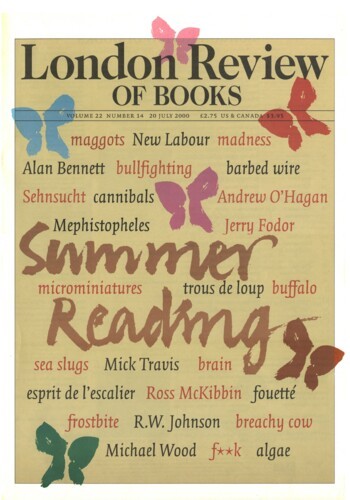When statistics start horning in on our language, or the way we use it, the results are seldom quite what we’d be happy to hear. To be told that, day in, day out, we rely on some wretchedly skimpy proportion, a bare few thousand, of the uncommonly luxuriant word-hoard available to us anglophones, is chastening, leading us at best into sporadic efforts to stretch our working vocabularies by bringing into play delightful words we’ve always known but have somehow never got around to airing in public. This is one way of warding off that nasty feeling that we could perfectly well get by in life with a starveling lexicon, that no one would even notice the repetitions, in an age that long ago rewrung the neck of eloquence.
Suppose, however, that even worse were to happen and we were reduced, in some awful aphasic episode, to just one word? One word, we know, can’t make a language all on its own; the minimum requirement for that would seem to be two words, so that some sort of primitive differentiation among the contents of the world about us becomes feasible. One word only couldn’t hope to make sense and the thought of such an ultimate form of reductionism isn’t a nice one. A version of it, however, has entered into the plans of the organisers of this September’s London Festival of Literature, who have launched ahead of time a ‘search for the nation’s favourite word’. This appears to be the brainchild (if that’s the word we’re looking for) of Sir Bob Geldof, whose own favourite word, it’s not wholly surprising to find out, is ‘f**k’, a choice that poses, if without answering, the question whether a verbal sign that contains two asterisks counts as a word of the language or not. Sir Bob’s – and might a knighthood not include the stipulation that its holder revert to the full syllabification of his name, and be known as Sir Robert? – sadly populist favourite sits ill on someone advertised in the publicity handouts as ‘The Word Festival Trustee’, since you’d hope for a trustee to come up with something a bit more advanced.
The Festival is inviting all those sufficiently word-conscious – or is it word-starved? – to want to be part of this preposterous search to e-mail their entries to geldof@theword.org.uk. If you still need persuading, then you have the word of Peter Florence, Artistic Director of The Word, that ‘thinking about which word means the most to you reveals who you are.’ Perhaps he should have told Sir Bob Geldof that.
‘No other granny can make Hitler quake in his boots.’ This curiously, or maybe only carelessly, tensed sentence, the implication of which is that whoever’s bullet-holed skull it was that got into the papers the other day, it wasn’t the Führer’s, launches the pre-publication blurb for HarperCollins’s very own tribute to the Queen Mother on the occasion of her 100th birthday, The Sun The Queen Mum: Her First 100 Years. The Sun so apposed in this title is the tabloid, whose claim to such precedence some might question, based as it is merely on the fact that the words in this loyal album have been written by its Royal Reporter and the photographs taken by its Royal Photographer, ‘the two people who know her better than anyone, outside the perimeters of Buckingham Palace and Clarence House’. It appears that Hitler described the Queen Mother as ‘the most dangerous woman in Britain’, a judgment which, given the man’s record, can but be taken as flattering whatever its original context.
Send Letters To:
The Editor
London Review of Books,
28 Little Russell Street
London, WC1A 2HN
letters@lrb.co.uk
Please include name, address, and a telephone number.

